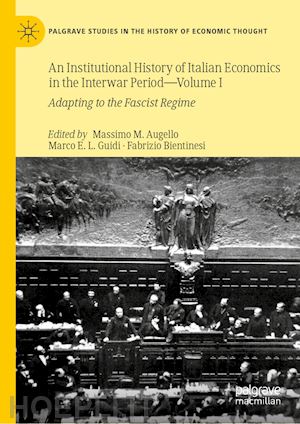
Questo prodotto usufruisce delle SPEDIZIONI GRATIS
selezionando l'opzione Corriere Veloce in fase di ordine.
Pagabile anche con Carta della cultura giovani e del merito, 18App Bonus Cultura e Carta del Docente
Italy is well known for its prominent economists, as well as for the typical public profile they have constantly revealed. But, when facing an illiberal and totalitarian regime, how closely did Italian economists collaborate with government in shaping its economic and political institutions, or work independently? This edited book completes a gap in the history of Italian economic thought by providing a complete work on the crucial link between economics and the Fascist regime, covering the history of political economy in Italy during the so-called “Ventennio” (1922-1943) with an institutional perspective. The approach is threefold: analysis of the academic and extra-academic scene, where economic science was elaborated and taught, the connection between economics, society and politics, and, dissemination of scientific debate. Special attention is given to the bias caused by the Fascist regime to economic debate and careers.
This Volume I deals with the economics profession under Fascism, in particular in light of the political and institutional changes that the regime introduced, the restructuring of higher education, the restriction of freedom in teaching and of the press, and with respect to promoting its own strategies of political and ideological propaganda.
Volume II (available separately) considers the public side of the economics profession, the “fascistisation” of culture and institutions, banishment and emigration of opponents, and post-WW2 purge of Fascist economists.
Massimo M. Augello is Professor of History of Economic Thought at the University of Pisa and former Rector of this University. He has coordinated various national and international projects on the institutionalisation, professionalisation and dissemination of economics. His contributions have been published in over 20 edited volumes, and in a range of international journals.
Fabrizio Bientinesi is Professor of History of Economic Thought at the University of Pisa. His research interests are concentrated on the history of Italian economic thought. He is the author of a book on the contribution of Italian economists to the theory of international trade, and of various papers published in a range of journals of history.
Marco E.L. Guidi is Professor of History of Economic Thought at the University of Pisa. He has been visiting professor at various French universities, and coordinator of a European project on the translation of economics works. His works on this topic have been published in various edited books and international journals.











Il sito utilizza cookie ed altri strumenti di tracciamento che raccolgono informazioni dal dispositivo dell’utente. Oltre ai cookie tecnici ed analitici aggregati, strettamente necessari per il funzionamento di questo sito web, previo consenso dell’utente possono essere installati cookie di profilazione e marketing e cookie dei social media. Cliccando su “Accetto tutti i cookie” saranno attivate tutte le categorie di cookie. Per accettare solo deterninate categorie di cookie, cliccare invece su “Impostazioni cookie”. Chiudendo il banner o continuando a navigare saranno installati solo cookie tecnici. Per maggiori dettagli, consultare la Cookie Policy.